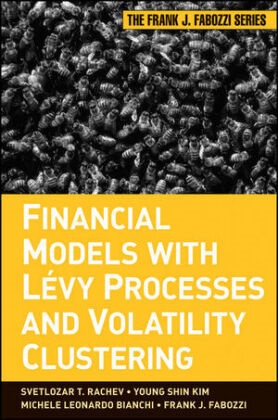Read more
Informationen zum Autor SVETLOZAR T. RACHEV is Chair-Professor in Statistics, Econometrics, and Mathematical Finance at the Karlsruhe Institute of Technology (KIT) in the School of Economics and Business Engineering; Professor Emeritus at the University of California, Santa Barbara; and Chief Scientist at FinAnalytica Inc. YOUNG SHIN KIM is a scientific assistant in the Department of Statistics, Econometrics, and Mathematical Finance at the Karlsruhe Institute of Technology (KIT). MICHELE Leonardo BIANCHI is an analyst in the Division of Risk and Financial Innovation Analysis at the Specialized Intermediaries Supervision Department of the Bank of Italy. FRANK J. FABOZZI is Professor in the Practice of Finance and Becton Fellow at the Yale School of Management and Editor of the Journal of PortfolioManagement. He is an Affiliated Professor at the University of Karlsruhe's Institute of Statistics, Econometrics, and Mathematical Finance and serves on the Advisory Council for the Department of Operations Research and Financial Engineering at Princeton University. Klappentext FINANCIAL MODELS WITH LéVY PROCESSES AND VOLATILITY CLUSTERING The failure of financial models has been identified by some market observers as a major contributor to the global financial crisis. More specifically, it's been argued that the underlying assumption made in most of these models-that distributions of prices and returns are normally distributed-have been responsible for their undoing. Financial crises and black swan events may not be precisely predictable by models, but improving the reliability and flexibility of those models is essential for both financial practitioners and academics intent on limiting the impact of major market crashes. In Financial Models with Lévy Processes and Volatility Clustering , authors Svetlozar Rachev, Young Shin Kim, Michele Leonardo Bianchi, and Frank Fabozzi focus on the application of non-normal distributions for modeling the behavior of stock price returns. Opening with a brief introduction to the basics of probability distributions, this practical resource quickly moves on to: Address a wide array of methods for the simulation of infinitely divisible distributions and Lévy processes with a view toward option pricing. Discuss two approaches to deal with non-normal multivariate distributions, providing insight into portfolio allocation assuming a multi-tail t distribution and a non-Gaussian multivariate model. Examine discrete time option pricing models with volatility clustering-namely non-Gaussian GARCH models. Provide guidance on pricing American options with Monte Carlo methods. If you want to gain a better understanding of how financial models can be used to capture the dynamics of economic and financial variables, Financial Models with Lévy Processes and Volatility Clustering is the best place to start. Zusammenfassung * In this book, authors Rachev, Kim, Bianchi, and Fabozzi present readers with the notions of risk and their corresponding performance measures. Inhaltsverzeichnis Preface. About the Authors. Chapter 1 Introduction. 1.1 The need for better financial modeling of asset prices. 1.2 The family of stable distribution and its properties. 1.3 Option pricing with volatility clustering. 1.4 Model dependencies. 1.5 Monte Carlo. 1.6 Organization of the book. Chapter 2 Probability distributions. 2.1 Basic concepts. 2.2 Discrete probability distributions. 2.3 Continuous probability distributions. 2.4 Statistic moments and quantiles. 2.5 Characteristic function. 2.6 Joint probability distributions. 2.7 Summary. Chapter 3 Stable and tempered stable distributions. 3.1 a-Stable distribut...
List of contents
Preface.
About the Authors.
Chapter 1 Introduction.
1.1 The need for better financial modeling of asset prices.
1.2 The family of stable distribution and its properties.
1.3 Option pricing with volatility clustering.
1.4 Model dependencies.
1.5 Monte Carlo.
1.6 Organization of the book.
Chapter 2 Probability distributions.
2.1 Basic concepts.
2.2 Discrete probability distributions.
2.3 Continuous probability distributions.
2.4 Statistic moments and quantiles.
2.5 Characteristic function.
2.6 Joint probability distributions.
2.7 Summary.
Chapter 3 Stable and tempered stable distributions.
3.1 alpha-Stable distribution.
3.2 Tempered stable distributions.
3.3 Infinitely divisible distributions.
3.4 Summary.
3.5 Appendix.
Chapter 4 Stochastic Processes in Continuous Time.
4.1 Some preliminaries.
4.2 Poisson Process.
4.3 Pure jump process.
4.4 Brownian motion.
4.5 Time-Changed Brownian motion.
4.6 Lévy process.
4.7 Summary.
Chapter 5 Conditional Expectation and Change of Measure.
5.1 Events, s-fields, and filtration.
5.2 Conditional expectation.
5.3 Change of measures.
5.4 Summary.
Chapter 6 Exponential Lévy Models.
6.1 Exponential Lévy Models.
6.2 Fitting a-stable and tempered stable distributions.
6.3 Illustration: Parameter estimation for tempered stable distributions.
6.4 Summary.
6.5 Appendix : Numerical approximation of probability density and cumulative distribution functions.
Chapter 7 Option Pricing in Exponential Lévy Models.
7.1 Option contract.
7.2 Boundary conditions for the price of an option.
7.3 No-arbitrage pricing and equivalent martingale measure.
7.4 Option pricing under the Black-Scholes model.
7.5 European option pricing under exponential tempered stable Models.
7.6 The subordinated stock price model.
7.7 Summary.
Chapter 8 Simulation.
8.1 Random number generators.
8.2 Simulation techniques for Lévy processes.
8.3 Tempered stable processes.
8.4 Tempered infinitely divisible processes.
8.5 Time-changed Brownian motion.
8.6 Monte Carlo methods.
Chapter 9 Multi-Tail t-distribution.
9.1 Introduction.
9.2 Principal component analysis.
9.3 Estimating parameters.
9.4 Empirical results.
9.5 Conclusion.
Chapter 10 Non-Gaussian portfolio allocation.
10.1 Introduction.
10.2 Multifactor linear model.
10.3 Modeling dependencies.
10.4 Average value-at-risk.
10.5 Optimal portfolios.
10.6 The algorithm.
10.7 An empirical test.
10.8 Summary.
Chapter 11 Normal GARCH models.
11.1 Introduction.
11.2 GARCH dynamics with normal innovation.
11.3 Market estimation.
11.4 Risk-neutral estimation.
11.5 Summary.
Chapter 12 Smoothly truncated stable GARCH models.
12.1 Introduction.
12.2 A Generalized NGARCH Option Pricing Model.
12.3 Empirical Analysis.
12.4 Conclusion.
Chapter 13 Infinitely divisible GARCH models.
13.1 Stock price dynamic.
13.2 Risk-neutral dynamic.
13.3 Non-normal infinitely divisible GARCH.
13.4 Simulate infin

